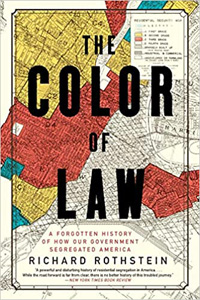 Richard Rothstein, The Color of Law: A Forgotten History of How Our Government Segregated America (New York: Liveright, 2017), 342pp.
Richard Rothstein, The Color of Law: A Forgotten History of How Our Government Segregated America (New York: Liveright, 2017), 342pp.
About a year ago I wrote an essay called "Reading Black America" that gathered nearly seventy JWJ reviews of books about our Black Lives Moment. Richard Rothstein's book belongs at the very top of that list; it is a devastating and deeply disturbing book of meticulous scholarship. The Color of Law has won numerous awards, and been on just about everyone's "best books of the year" list.
How did the United States become so deeply divided by race? Rothstein argues that there are two broad ways to think about this problem, echoing the language of Chief Justice John Roberts. The most powerful and prevalent view is that our racial segregation is the result of private choices, personal prejudices, habits, and the "unintended consequences of individual choices," like white flight and self-segregation. This de facto view of systemic racism is a small part of the truth, but in Rothstein's view it is also a mendacious myth and comforting delusion.
He argues that American segregation has been driven not just by personal choices, but primarily by state action. Our racial divide didn't "just happen;" it was a "purposeful imposition" by the government. Until 1968 and the Fair Housing Act, for over two centuries every level of government—federal, state, and local, actively and aggressively mandated racist policies. So did every other important social institution—churches (both liberal and conservative), the courts, school boards and textbooks, hospitals, developers, police, insurance companies, universities, the military, banks and builders.
There was nothing subtle or hidden about this de jure racism. One of the many photos Rothstein includes, for example, shows a sign by the Veterans Administration advertising that a 1950 housing development in Los Angeles was for whites only. Government mandated racism took place nationwide; virtually no community or metropolitan region was excepted. This might sound overstated, but you realize that it's not when you read 300 pages of examples both large and small of every conceivable sort of pro-active discrimination—zoning ordinances; voter suppression; bans on interracial marriage; wage suppression; deed restrictions; color coded real estate maps; discriminatory lending, appraisals, and insurance; redlining and reverse redlining; blockbusting; unfair tax exemptions—these are only a few of the many dozens of examples painstakingly documented by Rothstein.
The "core argument," of his book, says Rothstein, is that "African Americans were unconstitutionally denied the means and the right to integration into middle-class neighborhoods, and because this denial was state-sponsored, the nation is obligated to remedy it." In his last chapters he suggests some remedies, but he is also ruthlessly realistic. Civil rights advances like voting or school desegregation have been easier to address than housing. Nonetheless, addressing state-sponsored racism is not just a moral obligation, it's our constitutional duty.
Dan Clendenin: dan@journeywithjesus.net


